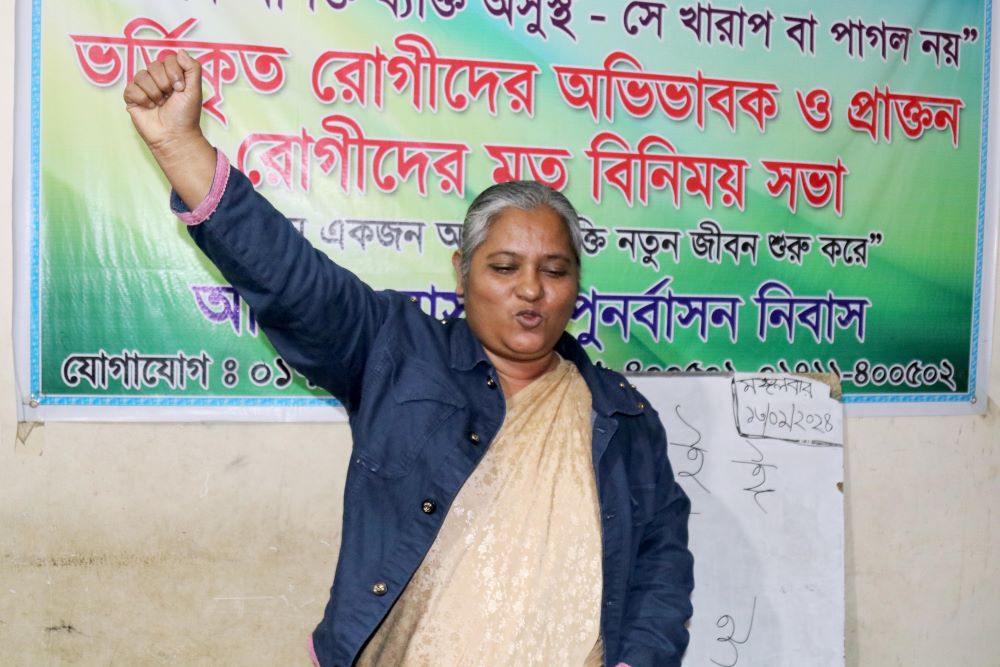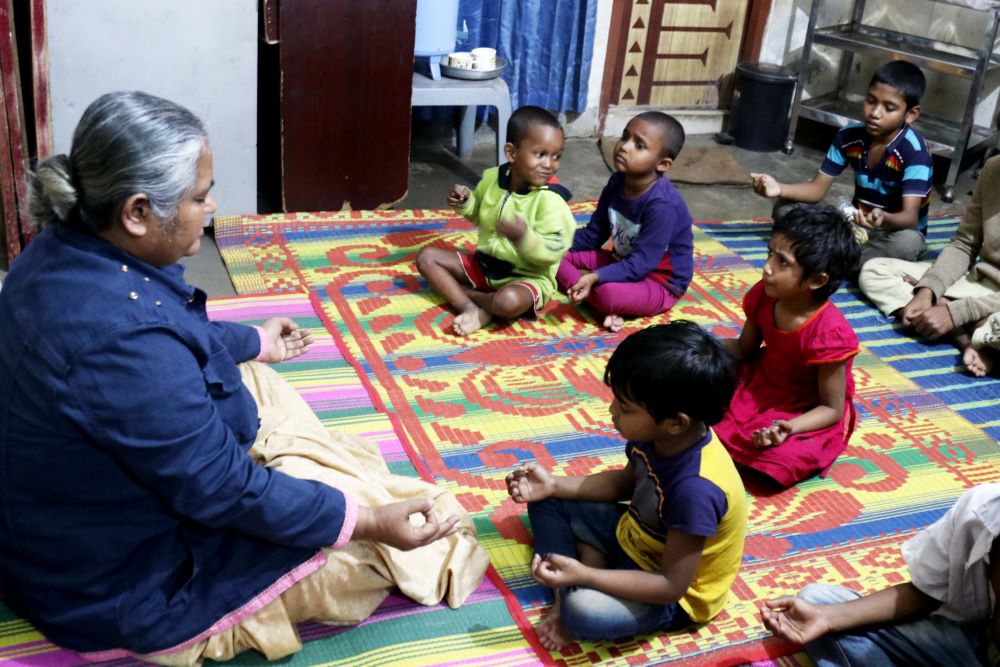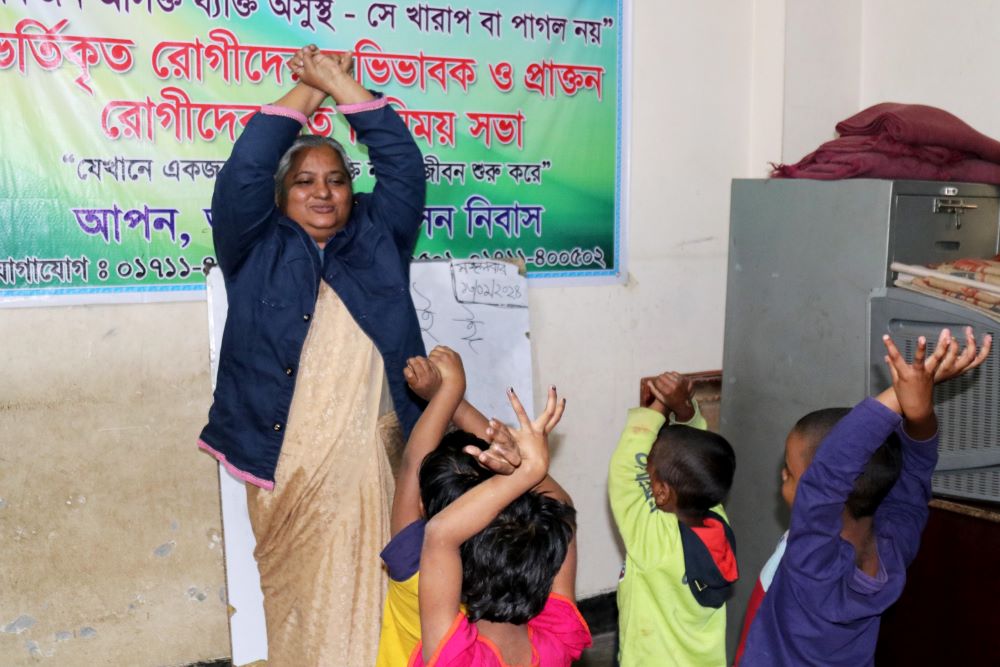
Holy Cross Sr. Monju Maria Corraya works with street children who are addicted to drugs in Dhaka, Bangladesh. (GSR photo/Stephan Uttom Rozario)
Holy Cross Sr. Monju Maria Corraya is a missionary in Bangladesh. She is the second among six siblings. She grew up in a tight-knit family, and they provided the impetus for her entry into missionary life. Evening prayers, helping each other and serving the sick inspired her from childhood to enter religious life. The Sisters of the Holy Cross worked in her area on the outskirts of the capital Dhaka, and she grew up observing them from an early age. Her family visited the Holy Cross Sisters when she was a child, and from there, she decided to become a Holy Cross Sister and started walking that way.
She entered the Holy Cross community in 1990, took her first vows in 1993 and her final vows in 1999. She started pastoral work after taking her first vows, and since 2005, she has worked with drug-addicted street children under her auspices. Since 2005, she has worked at Ashokti Punorbashon Nibash, or APON, an addiction rehabilitation center run by the Holy Cross Brothers. She also has a master's in Bengali literature and studied theology in India for one year.
With nearly 20 years' experience working with drug-addicted children, Corraya spoke to Global Sisters Report about her experience and the causes and remedies for drug addiction in children in the country.
GSR: What inspired you to become a sister?
Corraya: My grandparents especially inspired me to become a sister. By serving my grandfather when he was sick, I realized the joy of serving people and got inspiration. From the joy of that service, I felt I could serve more people if I became a sister. At the same time, the life of Jesus Christ and loving and serving people inspired me to enter the religious life. I have always tried, and still try, to love Jesus and follow his life.
How did you start working with drug-addicted children?
When I finished pastoral work in the countryside, and my superior brought me to Dhaka, I used to come to the APON meetings. I learned about them and got the inspiration to work with these children. After attending a few meetings, my interest grew strongly. At that time, we also worked with women. Many of the women who took drugs were sex workers, so I also worked with them.

Sr. Monju Maria Corraya meditates with children in the drop-in center at central Dhaka, Bangladesh. "Drug addiction is a social disease," she told Global Sisters Report. (GSR photo/Stephan Uttom Rozario)
What do you remember most about working with street children?
When I first started working, it was challenging because I didn't grow up in this environment or witness these situations closely. Women like me or around my age are sex workers, and some are taking and selling drugs. These things have me very worried. Their children are suffering, which moved me a lot. Drug addiction is a social disease that still exists in society today.
Why does society allow this?
No one in society will say that his or her son or daughter is addicted to drugs. They try to hide it as much as they can. Because they think it is a shameful thing. But it is a disease that is treatable. Br, Ronald Drahozal, the founder of APON, used to say, "Drug addicts are neither bad nor crazy." But people think they are crazy and bad.
Many come to us whose parents keep secrets, and we keep secrets, too. Many families will never send their children to rehab if they are addicted to drugs because they think it will ruin their reputation if people find it out. It has become a social barrier or social taboo.
How successful are you in what you want to do?
I think I am doing my job very well. I believe and consider myself a lucky person. The work I can do out of love for those who receive service from me is my success. I realized there are so many hardships in people's lives and struggles, and finally, they end up on the streets, sometimes as sex workers. They trust me a lot. They confess to me any antisocial act they do. They come to me when they are sick, and if I give them a little medicine, they get well because of faith. They believe in me so much that many say I am their parents, and tears come to my eyes with pride.
I am working with them and will continue with them as long as I can. No matter how hard it is, seeing them makes my pain go away. I don't have any personal pain, but seeing their pain hurts me.
Have you faced any social challenges?
As a Christian nun working outside with these children, I did not face social challenges. People around me have helped me a lot. The owner of where we stayed before was an Islamic cleric but helped me. Since most of our kids are addicted to drugs, they are sometimes unruly, and it is a bit difficult to get a house to rent, and not everyone in society accepts it.
Initially, when I came to this work, I was very worried about their suffering. But now I have overcome that pain. Many call them crazy, but they are not crazy. As they are often involved in anti-social activities, the police came and interrogated me many times, but they did not find any fault.

r. Monju Maria Corraya works with street children who are addicted to drugs in Dhaka, Bangladesh. She said the children and families trust her. (GSR photo/Stephan Uttom Rozario)
How do you overcome this challenge?
With faith in God and love for people. We are working with the same enthusiasm as our founder encouraged us. I think no challenge is permanent in doing good work. Challenges will come, and it is possible to face them with honesty, concentration, morale and faith in God, and I am doing that.
How many steps are in this center, and how does it work?
There are three steps. First, our workers go to various populated places, find street children, give them some food, play with them and if anyone is injured, they are given primary care. Secondly, children come to our center to study, play sports, watch TV and rest. And the third step is if any child wants to recover from drug addiction, then we send them to the main center at APON.
Currently, around 20 children are under treatment at the center. We provide counseling for parents and counseling for children. We also connect some children who are a little older with various NGOs where they learn technical education.
Why are children addicted to drugs?
Many of our children come from villages, and most of the time, they don't have parents, or their stepparents don't treat them well. They often like to study but drop out when pressured by family. Sometimes, children resent their parents. They leave the house if their parents scold them or push them to study. They are not drug addicts when they first come to the street. Often, they get food from those already in the street, but how many days will they give you food? The children are empathetic toward one another, but they cannot feed another person for long.
Later, they are asked to do immoral things to survive. Police beat them. Then, they take drugs to escape the pain. They start taking drugs because of hunger and physical pain. Many times, in slum areas where parents are involved in drugs, then the children of those families are also addicted to drugs.
I think society and family are responsible for those children. They are used to transport drugs to collect drug money. This is how they become associated with drug consumption. Children are easily addicted to drugs due to their availability.
Sr. Monju Maria Corraya distributes biscuits to each child every day at the center. (GSR photo/Stephan Uttom Rozario)
Where does the money you spend on this work come from?
We used to have funds, but now we don't. We cannot accommodate many children because there is no space available. Now the cost is paid by APON. If we had more funds, we could have more children. So, we need more funds to expand our work.
In your nearly 20 years of experience, what do you think is the solution to this problem?
We provide counseling to the parents of those who have parents and arrange treatment for those addicted to drugs. For adults, we try to provide treatment, teach or offer them technical education and help them make a small business. We try to find ways so they can stay healthy. For example, we sell boiled eggs and [healthy] drinks. They pay our expenses and take a share of the profits. They are better off under our surveillance.
When those with parents come to centers like ours, we should send them to their families and offer counseling to the families. Also, increasing public awareness of not giving drugs to children across the country can be a solution.
Advertisement
What is your advice to parents whose children are drug addicts?
Don't let it happen. Give time to your child and love them as much as you can. Then, your children will not go astray. Children do not become addicted to drugs in one day, it happens gradually. Parents should patiently listen to their children and try to understand their needs.
Most parents do not take proper care of their children. They are fulfilling their desire to be parents but not their responsibility towards their children. They fulfill the children's external needs but do not give children the love they need. The parents' feelings should be understood by their children, and the children's feelings should be understood by their parents.
How are you spreading the word of Christ through your work?
As a person and as a Catholic sister, I walk according to the example of Jesus as my guide, and through this, I am spreading the word of Christ. Everyone here calls me sister. They know I am a Christian, but Christianity is not practiced here. But by my work, actions and words, they understand that I am a Christian. At meals, there is universal prayer, and at meditation, we remember God universally. People of other religions understand and know that Christians pray according to the words of Christ. They trust me so much, respect me and won't allow anyone to insult me.







